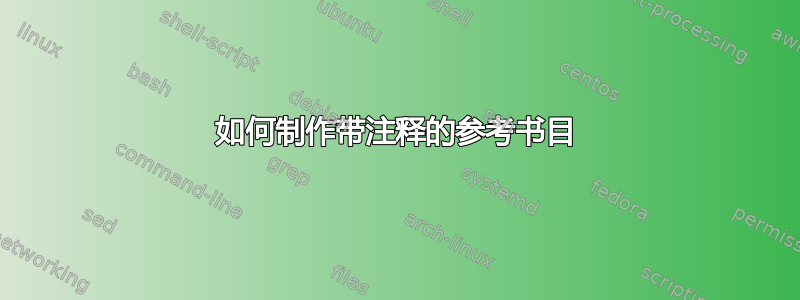
我必须制作一个带注释的参考书目,但坦率地说,这是我第一次做这样的事情,而网上的解决方案要么 a)不起作用,要么 b)根本无法理解,因此带注释的参考书目需要如下所示:

请帮帮忙!!我该如何实现这个?这是我当前的 bib 文件:
@inproceedings{marolt2002neural,
title={Neural networks for note onset detection in piano music},
author={Marolt, Matija and Kavcic, Alenka and Privosnik, Marko},
booktitle={Proceedings of the International Computer Music Conference},
year={2002}
}
@inproceedings{marolt2000transcription,
title={Transcription of polyphonic piano music with neural networks},
author={Marolt, Matija},
booktitle={Electrotechnical Conference, 2000. MELECON 2000. 10th Mediterranean},
volume={2},
pages={512--515},
year={2000},
organization={IEEE}
}
@inproceedings{bock2012polyphonic,
title={Polyphonic piano note transcription with recurrent neural networks},
author={Bock, S and Schedl, Markus},
booktitle={Acoustics, Speech and Signal Processing (ICASSP), 2012 IEEE International Conference on},
pages={121--124},
year={2012},
organization={IEEE}
}
@inproceedings{costantini2010svm,
title={SVM based transcription system with short-term memory oriented to polyphonic piano music},
author={Costantini, Giovanni and Todisco, Massimiliano and Perfetti, Renzo and Basili, Roberto and Casali, Daniele},
booktitle={MELECON 2010-2010 15th IEEE Mediterranean Electrotechnical Conference},
pages={196--201},
year={2010},
organization={IEEE}
}
@inproceedings{nava2004convolutional,
title={A convolutional-kernel based approach for note onset detection in piano-solo audio signals},
author={Nava, Gabriel Pablo and Tanaka, Hidehiko and Ide, Ichiro},
booktitle={Int. Symp. Musical Acoust. ISMA},
pages={289--292},
year={2004}
}
@inproceedings{dixon2001learning,
title={Learning to detect onsets of acoustic piano tones},
author={Dixon, Simon},
booktitle={Proceedings of the Workshop on Current Directions in Computer Music Research},
pages={147--151},
year={2001}
}
@article{poliner2006discriminative,
title={A discriminative model for polyphonic piano transcription},
author={Poliner, Graham E and Ellis, Daniel PW},
journal={EURASIP Journal on Advances in Signal Processing},
volume={2007},
year={2006},
publisher={Hindawi Publishing Corporation}
}
这是我的 .tex 文件:
\documentclass{article}
\begin{document}
\maketitle
\newpage
\bibliographystyle{plain-annote}
\bibliography{sample}
\cite{marolt2002neural}
\end{document}
答案1
由于您似乎想要特定的格式,我倾向于不将所有内容都保留在文件中.bib。如果您的示例显示的字段将毫无疑问地用于每个条目,那么就像(假设使用biblatex)这样简单的事情
\newcommand{\annote}[5]{%
\begingroup
\parindent 0pt%
\hangafter 1%
\hangindent 1em%
\cite{#1}\space \fullcite{#1}\par
\begin{quote}
\textbf{Aim:}\quad #2\par%
\textbf{Style/Type:}\quad #3\par%
\textbf{Cross References:}\quad #4\par%
\textbf{Summary:}\quad #5\par%
\end{quote}%
\endgroup
}
就可以了。然后你只需要使用类似下面的命令:
\annote{marolt2002neural}
{To demonstrate the merit of inverse reinforcement learning techniques in deriving a probability distribution over a space of reward functions, given expert training data.}
{Conference Paper/Theoretical.}
{Algorithms and techiniques from this paper are employed by \cite{bock2012polyphonic}}
{In this paper \ldots}
但也许字段不是静态的,而且这种方式可能很难记住哪个参数用于“样式”,哪个参数用于“交叉引用”。也许并非所有字段都会用于每个条目。如果您需要灵活性,则“键值”方法更好。这里您有很多选择。以下是其中一种方法:
\usepackage{xparse}
\ExplSyntaxOn
% set up the keys 'aim', 'style', 'xref', and 'summary'
\keys_define:nn { annotation }
{
% setup
aim .tl_set:N = \l_ann_aim_tl,
style .tl_set:N = \l_ann_style_tl,
xref .tl_set:N = \l_ann_xref_tl,
summary .tl_set:N = \l_ann_summary_tl,
% default values:
aim .initial:n = TODO!,
style .initial:n = TODO!,
xref .initial:n = [none],
summary .initial:n = TODO!,
}
% set the keys
\NewDocumentCommand{\annoteinfo}{ m }
{
\keys_set:nn { annotation } { #1 }
}
% print and format the keys
\NewDocumentCommand{\printentry} {mm}
{
\begingroup
% how things should look:
\parindent0pt \hangafter 1 \hangindent 1em%
% provide the citation:
\cite{#2}\space \fullcite{#2}\par
% the keys will be used inside the quote environment
\begin{quote}
\annoteinfo{#1}
\textbf{Aim:}\quad \l_ann_aim_tl\par
\textbf{Style:}\quad \l_ann_style_tl\par
\textbf{Cross-references:}\quad \l_ann_xref_tl\par
\textbf{Summary:}\quad \l_ann_summary_tl\par
\end{quote}
\endgroup
}
\ExplSyntaxOff
综上所述:
\documentclass{article}
% the following is used to make the example self-contained:
\usepackage{filecontents}
\begin{filecontents*}{\jobname.bib}
@inproceedings{marolt2002neural,
title={Neural networks for note onset detection in piano music},
author={Marolt, Matija and Kavcic, Alenka and Privosnik, Marko},
booktitle={Proceedings of the International Computer Music Conference},
year={2002}
}
@inproceedings{marolt2000transcription,
title={Transcription of polyphonic piano music with neural networks},
author={Marolt, Matija},
booktitle={Electrotechnical Conference, 2000. MELECON 2000. 10th Mediterranean},
volume={2},
pages={512--515},
year={2000},
organization={IEEE}
}
@inproceedings{bock2012polyphonic,
title={Polyphonic piano note transcription with recurrent neural networks},
author={Bock, S and Schedl, Markus},
booktitle={Acoustics, Speech and Signal Processing (ICASSP), 2012 IEEE International Conference on},
pages={121--124},
year={2012},
organization={IEEE}
}
@inproceedings{costantini2010svm,
title={SVM based transcription system with short-term memory oriented to polyphonic piano music},
author={Costantini, Giovanni and Todisco, Massimiliano and Perfetti, Renzo and Basili, Roberto and Casali, Daniele},
booktitle={MELECON 2010-2010 15th IEEE Mediterranean Electrotechnical Conference},
pages={196--201},
year={2010},
organization={IEEE}
}
@inproceedings{nava2004convolutional,
title={A convolutional-kernel based approach for note onset detection in piano-solo audio signals},
author={Nava, Gabriel Pablo and Tanaka, Hidehiko and Ide, Ichiro},
booktitle={Int. Symp. Musical Acoust. ISMA},
pages={289--292},
year={2004}
}
@inproceedings{dixon2001learning,
title={Learning to detect onsets of acoustic piano tones},
author={Dixon, Simon},
booktitle={Proceedings of the Workshop on Current Directions in Computer Music Research},
pages={147--151},
year={2001}
}
@article{poliner2006discriminative,
title={A discriminative model for polyphonic piano transcription},
author={Poliner, Graham E and Ellis, Daniel PW},
journal={EURASIP Journal on Advances in Signal Processing},
volume={2007},
year={2006},
publisher={Hindawi Publishing Corporation}
}
\end{filecontents*}
\usepackage[T1]{fontenc}
\usepackage[backend=biber, style=alphabetic]{biblatex}
\addbibresource{\jobname.bib}
\usepackage{xparse}
% If the fields are all required and are always the same
\newcommand{\annote}[5]{%
\begingroup
\parindent 0pt%
\hangafter 1%
\hangindent 1em%
\cite{#1}\space \fullcite{#1}\par
\begin{quote}
\textbf{Aim:}\quad #2\par%
\textbf{Style/Type:}\quad #3\par%
\textbf{Cross References:}\quad #4\par%
\textbf{Summary:}\quad #5\par%
\end{quote}%
\endgroup
}
% If the fields are not all required...
\ExplSyntaxOn
\keys_define:nn { annotation }
{
% setup
aim .tl_set:N = \l_ann_aim_tl,
style .tl_set:N = \l_ann_style_tl,
xref .tl_set:N = \l_ann_xref_tl,
summary .tl_set:N = \l_ann_summary_tl,
% defaults (change as needed)
aim .initial:n = TODO!,
style .initial:n = TODO!,
xref .initial:n = [none],
summary .initial:n = TODO!,
}
\NewDocumentCommand{\annoteinfo}{ m }
{
\keys_set:nn { annotation } { #1 }
}
\NewDocumentCommand{\printentry} {mm}
{
\begingroup
% the next line does most of the visual formatting...
\parindent0pt \hangafter 1 \hangindent 1em%
\cite{#2}\space \fullcite{#2}\par
% annotations are in the following environment...
\begin{quote}
\annoteinfo{#1}
\textbf{Aim:}\quad \l_ann_aim_tl \par
\textbf{Style:}\quad \l_ann_style_tl \par
\textbf{Cross-references:}\quad \l_ann_xref_tl \par
\textbf{Summary:}\quad \l_ann_summary_tl \par
\end{quote}
\endgroup
}
\ExplSyntaxOff
\begin{document}% ---------------------------------------------------
% These two entries are done the 'easy' way
\annote{marolt2002neural}
{To demonstrate the merit of inverse
reinforcement learning techniques in deriving a probability
distribution over a space of reward functions, given expert training
data.}
{Conference Paper/Theoretical.}
{Algorithms and techiniques from
this paper are employed by \cite{bock2012polyphonic}}
{In this paper \ldots}
\annote{marolt2000transcription}
{Aim}
{Style}
{Cross-reference}
{Summary}
% these are the key-value entries
\printentry{
aim={To demonstrate things},
summary={This is the abstract},
}
{bock2012polyphonic}
\printentry{
style={Conference proceedings}
}
{costantini2010svm}
\printentry{
style={Info on style},
summary={Summary information goes here},
}
{nava2004convolutional}
\printentry{
aim={1},
style={2},
xref={3},
summary={4}}
{dixon2001learning}
\printentry{
aim={5},
style={6},
%xref={7},
summary={8}}
{poliner2006discriminative}
% this is how a bibliography is printed with biblatex
%\printbibliography
\end{document}
笔记:这个答案依赖于biblatex(和biber,虽然在这种情况下不需要)因为它方便地包含一个\fullcite命令。
答案2
以下略微修改了 @jon 的\printentry上述命令块,以便在未提供键时不打印任何内容。正如回答的那样,@jon 的回复将始终打印示例中的四个字段。最好只打印提供键值的字段。请参阅此链接了解解决方案的详细信息。因此:
\usepackage{xparse}
\usepackage{xifthen}
\ExplSyntaxOn
\keys_define:nn { annotation }
{
% setup
aim .tl_set:N = \l_ann_aim_tl,
style .tl_set:N = \l_ann_style_tl,
xref .tl_set:N = \l_ann_xref_tl,
summary .tl_set:N = \l_ann_summary_tl,
}
\NewDocumentCommand{\annoteinfo}{ m }
{
\keys_set:nn { annotation } { #1 }
}
\NewDocumentCommand{\printentry} {mm}
{
\begingroup
% the next line does most of the visual formatting...
\parindent0pt \hangafter 1 \hangindent 1em%
\fullcite{#2}. \par %\cite{#1}\space \fullcite{#1}\par
% annotations are in the following environment...
\begin{quote}
\annoteinfo{#1}
\tl_if_blank:VF \l_ann_aim_tl {\textbf{Aim:}\quad \l_ann_aim_tl \par}
\tl_if_blank:VF \l_ann_style_tl {\textbf{Style:}\quad \l_ann_style_tl \par}
\tl_if_blank:VF \l_ann_xref_tl {\textbf{Cross-references:}\quad \l_ann_xref_tl \par}
\tl_if_blank:VF \l_ann_summary_tl {\textbf{Summary:}\quad \l_ann_summary_tl \par}
\end{quote}
\endgroup
}
\ExplSyntaxOff


